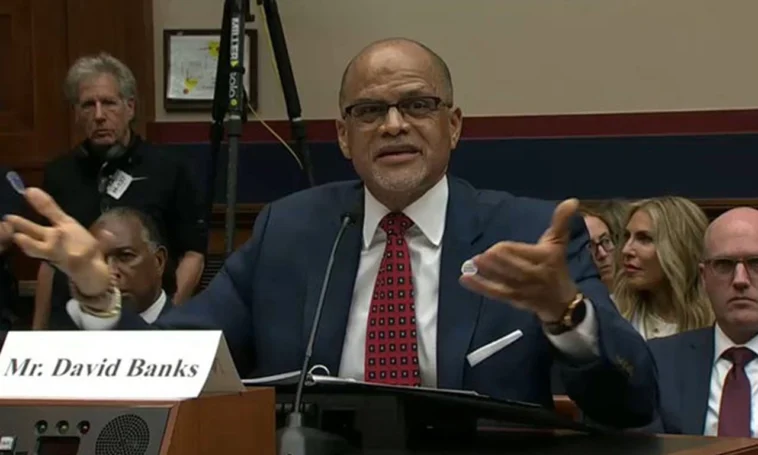During the House antisemitism hearing, the NYC schools leader highlighted a case that deeply troubled him, underscoring the pervasive nature of antisemitism in educational settings.
The Chancellor of New York City Public Schools, David Banks, testified before the Subcommittee on Early Childhood, Elementary and Secondary Education on Capitol Hill, revealing that there have been 281 antisemitic and Islamophobic incidents in the school system since October 7th. While all incidents are taken seriously, one case at Origins High School in Brooklyn has particularly troubled him.
During the hearing, Rep. Elise Stefanik (R-NY) described the incident, where 40-50 students marched through the school chanting “Death to Israel” and “Kill the Jews.” An independent investigation also found that a teacher was subjected to antisemitic slurs and threats by a student. Banks admitted that while no evidence was found of the students chanting “Death to the Jews” in the hallways, a range of deeply troubling antisemitic incidents have occurred at the school, resulting in the suspension of several students. However, the case is now under litigation, and Banks was advised not to discuss specifics.
The hearing highlighted the growing concern of antisemitism in K-12 schools, with Rep. Aaron Bean (R-FL) calling the need for the hearing a “travesty.” Banks emphasized the importance of responding appropriately to incidents and ensuring that students feel safe and supported. The hearing featured witnesses from some of the largest school districts in the nation, where vile antisemitism has been reported.
Banks acknowledged that while he cannot prevent every incident from happening, his role as a leader is to respond appropriately once an issue is brought to attention. He assured that the school system takes every incident seriously and initiates the appropriate level of conduct. The hearing aimed to confront the pervasive antisemitism in K-12 schools and find ways to address and prevent such incidents in the future.
“We looked at, and I treat that very, very seriously. That was reported in the papers. We have found no evidence that that actually happened,” he added.
The incident at Origins High School is particularly disturbing, as it involves a large group of students openly expressing hateful and violent sentiments towards Jewish people. The fact that a teacher was also targeted with antisemitic slurs and threats is equally alarming, as it highlights the extent to which hate can permeate the educational environment.
The school system’s response to the incident has been criticized by some, who argue that more needs to be done to address the root causes of antisemitism and ensure that students feel safe and supported. Banks’ admission that the case is now under litigation has raised concerns that the school system may be prioritizing legal considerations over the well-being of its students.
The hearing is a crucial step towards addressing the growing problem of antisemitism in K-12 schools. By bringing together educators, policymakers, and experts, it provides an opportunity to share best practices, discuss challenges, and identify solutions. The testimony of Chancellor Banks and other witnesses highlights the importance of taking a proactive approach to addressing antisemitism, rather than simply reacting to incidents as they occur.
In addition to the incident at Origins High School, the hearing also highlighted other disturbing examples of antisemitism in K-12 schools. These include incidents of vandalism, harassment, and intimidation, as well as the spread of hateful ideologies and conspiracy theories. The hearing made clear that antisemitism is a pervasive problem that requires a comprehensive and coordinated response.





2 Comments
Leave a Reply2 Pings & Trackbacks
Pingback:NYC mayor faces backlash for suggesting migrants excel at swimming - Hard Knock News
Pingback:School district DEI trainer argues American flag is turning into a symbol of hate, calls for firing employees - Hard Knock News
Join the Community and Be a Part of the Conversation
You must be logged in or registered to post a comment.